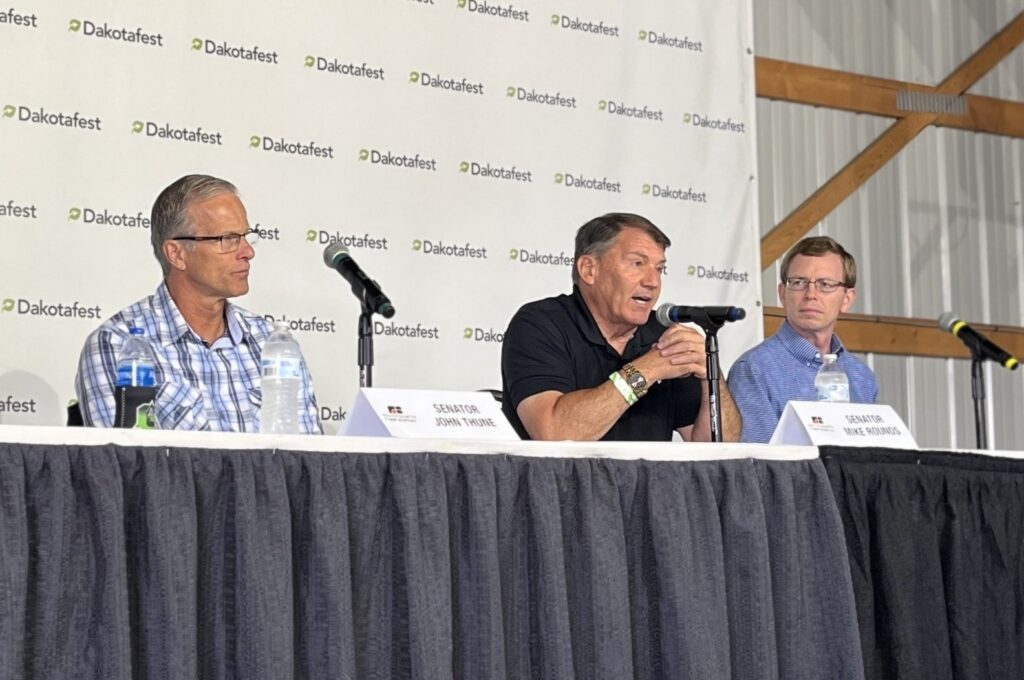
From left, U.S. Sen. John Thune, U.S. Sen. Mike Rounds and U.S. Rep. Dusty Johnson, all Republicans of South Dakota, talk about agriculture policy at Dakotafest in Mitchell on Aug. 21, 2024. (Joshua Haiar/South Dakota Searchlight)
I never thought I would see the day when U.S. Senators John Thune and Mike Rounds and Rep. Dusty Johnson would sell out their South Dakota values and upbringing to become puppets of a president.
Nor did I think I would see them damage institutions that are at the core of South Dakota’s society. Unfortunately, it appears that President Donald Trump is so powerful that personal values no longer matter.
Last week, all three voted to rescind $1.1 billion in funding for the Corporation for Public Broadcasting — funding that all three had previously voted to approve.
It’s clear that National Public Radio was Trump’s target. He believes taxpayer money shouldn’t be going to support news he perceives as a challenge to his line of thinking.
US House sends bill to Trump yanking funding for NPR, PBS, foreign aid; SD congressman votes yes
But often when we act hastily and with little thought, the grenades we throw miss the intended target and damage innocent victims.
Such is the case here. Only 1% of NPR’s operating budget and 15% of the Public Broadcasting System budget comes from the corporation, and both will survive. Most of the corporation’s funding goes to support local public broadcasting systems, which likely will not.
“After the cut, NPR is still going to be NPR and PBS is still going to be PBS,” said Julie Overgaard, executive director of South Dakota Public Broadcasting. “They are all going to continue to exist.”
So will public stations in the major metropolitan areas.
“It’s the places like us that will suffer the most,” Overgaard said. “The reason the CPB was set up was so that rural communities can share in a collective public media.
“We don’t have enough people and wealth to exist on our own. The very thing they were trying to eliminate will survive. Instead, it’s something very important to our state that will be eliminated.”
Programs like “South Dakota Focus,” “In the Moment,” “Dakota Life” and “Jazz Nightly,” along with statehouse coverage and broadcasts of high school sports and activities, may all disappear.
What a legacy for Thune, Rounds and Johnson — the men who destroyed SDPB.
Last week while casting their votes, they hid behind the need to cut the budget deficit. Funny. They found deficit religion only a few weeks after they voted for Trump’s Big Beautiful Bill Act that increases the deficit. The more talented politicians become, the better they are at creating alternative realities.
Here’s the reality of SDPB’s future.
The impending loss of $2 million in funding from the Corporation for Public Broadcasting may force SDPB to quickly cut up to 20 people from its 60-member staff. The damage likely will be worse. Even if SDPB could raise $2 million in three months, it probably wouldn’t matter.
The Corporation for Public Broadcasting is essentially dead as of Sept. 30, severing the technical backbone of SDPB’s network. It facilitates the sharing of programming from network to network. It facilitates emergency alerts and emergency alerts. It handles SDPB’s website and negotiates music broadcast rights nationally.
“The situation is grave, fluid and chaotic,” Overgaard said.
Rounds acted like he was the champion leading up to the vote, holding out to the last minute as he secured an agreement to find $9.4 million in funding elsewhere for communication towers on Native American reservations. That’s not likely to be sustainable in the long-term.
“It’s a nice gesture, but it is hollow in its result,” Overgaard said of Rounds’ action. “It will still result in the demise of tribal stations.”
Programs like Native American News and other nationally shared music and talk programs likely won’t be produced, and the national network that distributes it won’t exist. Money and technical support for local programming also disappear.
The very thing they were trying to eliminate will survive. Instead, it’s something very important to our state that will be eliminated.
– Julie Overgaard, SDPB executive director
SDPB had just survived a funding fight in the South Dakota Legislature after then-Gov. Kristi Noem suggested cutting $3.6 million in state funding, also largely aimed at silencing NPR. Legislators were inundated with calls, and the result was an overwhelming restoration of funding.
“We know we are very important in people’s daily lives,” Overgaard said. “They trust us in moments of crisis and joy. This has nothing to do with whether we are a valued service. This is politics. I don’t know that we ever had a chance to win this.”
The only chance is for federal funding to be restored in the upcoming federal budget, perhaps absent taxpayer support for NPR and PBS.
SDPB supporters will have opportunities to speak with their congressional delegates during the upcoming August recess. Looking at constituents in the eye can be uncomfortable.
Trump puppets are not what we thought we elected. Thune, Rounds and Johnson, what have you become?
EDITOR’S NOTE: Brad Johnson is married to a retired former employee of the nonprofit Friends of South Dakota Public Broadcasting.


